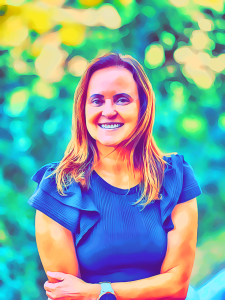177 Letter from Verônica Mayer

I am a professor at the Fluminense Federal University (UFF), a large public university in Brazil. I come from a small town and first arrived at UFF as a 16-year-old student — young, determined, and a little scared. Decades later, I returned as a faculty member. In between, I built a professional career in marketing, became a mother, earned a PhD, taught, researched, managed projects, and eventually embraced academic leadership. But it was within the public university that my journey became a deeper commitment — to teaching, to applied research, and to building knowledge that respects people and their time.
I entered research more intensively later in my career, after developing my voice as an educator and practitioner. That shaped my academic path: I’ve always been guided by real questions — those that emerge from everyday life, from the service sector, from the classroom, from actual decision-making processes in tourism. I’ve chosen methods that challenge me — like experimental design in behavioral economics — and I’ve dedicated myself to mentoring students who share a desire to produce relevant and rigorous knowledge.
Doing research in Brazil requires resilience. Doing it in tourism — a field still undervalued in many academic spaces — demands consistency, creativity, and collaboration. Over the years, I have led applied projects in partnership with colleagues, students, and institutions. These projects are not peripheral: they are central to the role of the university in society. They offer concrete contributions to real challenges, and they are often the space where students realize their potential and begin to understand that research can — and should — serve beyond the academic sphere. This is a theme I continue to explore: how academic knowledge, especially in tourism, can generate broader social impact.
Beyond these projects, I have worked to strengthen the research community as a whole. As a board member of ABRATUR — the International Academy for the Development of Tourism Research in Brazil — I supported the international visibility of Brazilian tourism research and advocated for approaches that reflect our diverse realities. As a member of the editorial board of the Revista Brasileira de Pesquisa em Turismo (RBTUR), I have focused on enhancing the journal’s quality while making space for emerging voices. Strengthening our field requires collective work — work that values quality, openness, and diversity.
I live in Rio de Janeiro, between the mountains and the sea. I recharge through ocean sports, through paddling my canoe into the horizon, through the company of my daughter — my greatest inspiration — and through the support of my husband, my friends, and my family, who quietly sustain many of my choices. Well-being is not just personal for me; it is part of how I work, and it is something I aim to nurture in those I mentor.
I am particularly proud of the mentoring relationships I’ve cultivated over the years. Most of the students I have advised are women, and many of them have faced — as I have — doubts, systemic barriers, and pressure. That’s why I’ve always tried to offer a work environment where care is not seen as a luxury, but as a foundational principle.
Because of that, I’ve also learned to care for myself. Mental health, emotional support, and balance are not side issues — they are central. Without them, we cannot sustain listening, productivity, or leadership. And we cannot teach what we don’t practice.
To those who are just beginning, let me be clear: your presence in this field is not a favor, it is not a mistake, and it does not require anyone’s permission. You may carry pauses, uncertainties, children, or a late start — none of these diminish your value. Research is not a competition, and knowledge is not the exclusive property of those who arrived first. Feelings of guilt or shame — for not knowing enough, for doing too little, for not fitting in — are illusions that silence many brilliant women. You are not a waste of time. Your background, your voice, and your way of seeing the world are valuable.
Along the way, it’s common to see people accepting exploitative dynamics or choosing easier shortcuts — opportunistic publications, questionable partnerships, hollow metrics. These may seem like a fast track, but they risk the most essential part of our work: our relationship with knowledge and with others. Time passes, and there is no undoing poor conduct. Building with integrity takes more effort — especially when easier paths aren’t offered to us — but it’s what sustains a meaningful academic journey.
Bring all of that into your research with pride. Take up space — not with arrogance, but with confidence. You have a place here. You belong.
Verônica Feder Mayer
Fluminense Federal University, Brazil

